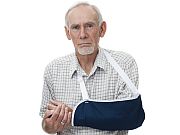
FRIDAY, May 15, 2015 (HealthDay News) — Men are far less likely than women to be screened for osteoporosis, even though they are more likely to suffer worse consequences from the bone-thinning condition, a new study finds.
Up to 2 million American men have osteoporosis, and another 8 million to 13 million men have low bone density, a precursor to osteoporosis, the researchers said.
While most women in the study said they would accept osteoporosis screening if it was offered, only 25 percent of men said they would get screened. Women were also over four times more likely than men to take measures to prevent osteoporosis, such as taking calcium and vitamin D supplements to strengthen their bones.
“We were surprised at how big a difference we found between men and women regarding osteoporosis,” study author Dr. Irina Dashkova, a geriatric fellow at North Shore-LIJ Health System in New Hyde Park, N.Y., said in a health system news release.
“The fact that longevity is increasing in our population is wonderful. But we know from research that when men suffer fractures, their mortality is higher than in women and that severe medical consequences and loss of independence are much more prevalent in men,” she said.
“In our environment, you just get this perception that osteoporosis is a women’s problem. This has to be changed, and the sooner the better,” Dashkova said in the news release.
The findings were to be presented Friday at the American Geriatrics Society annual meeting in Washington, D.C. Research presented at medical meetings should be viewed as preliminary until published in a peer-reviewed journal.
More than 10 million Americans have osteoporosis, and another 43 million have low bone density, according to the National Osteoporosis Foundation. Research suggests that 13 percent of white American men older than 50 will have at least one osteoporosis-related fracture in their lifetime.
Certain health problems and drugs that boost osteoporosis risk are specific to men, including some prostate cancer drugs, the researchers pointed out.
Dr. Gisele Wolf-Klein, program director for the geriatric fellowship at North Shore-LIJ, was a mentoring author and collaborated with Dashkova on the research. “Our survey clearly establishes that physicians are just not thinking of screening men. It’s only when older men fall and break their hip that someone thinks maybe we should do something to prevent them breaking the other hip,” Wolf-Klein said in the news release.
“Not only is society in general unaware of the problem of osteoporosis in men, men are not seeking screening and diagnosis,” she added.
More information
The U.S. National Institute of Arthritis and Musculoskeletal and Skin Diseases has more about men and osteoporosis.
Copyright © 2026 HealthDay. All rights reserved.

